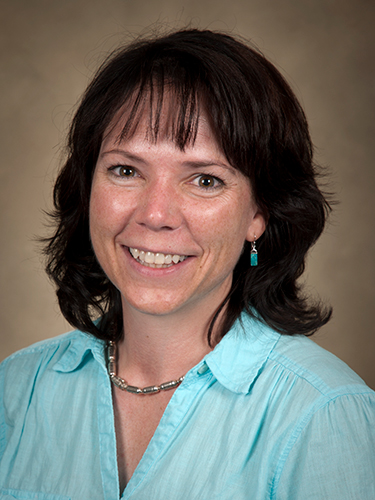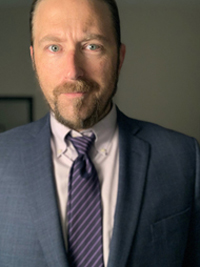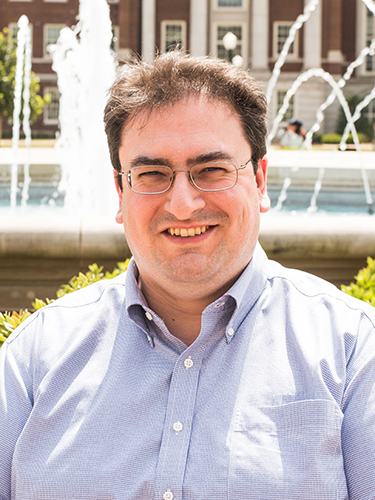 Carol Duffy
Carol Duffy
Distinguished Teaching Fellow, 2017-2020
Carol Duffy is an associate professor in the Department of Biological Sciences. She is a virologist whose research focuses on elucidating the molecular biology of herpesvirus replication as well as understanding the roles herpesviruses play in chronic illnesses. Duffy teaches courses in virology and molecular biology where she shares her passion for the intricate cellular mechanisms that underlie health and disease.
Teaching Philosophy
I believe the first order of business in the classroom is to engage the students. Learning can depend as much on the attitudes of the students as on the performance of the teacher. Therefore, it is important to get students actively involved in their own learning and get them to give their best learning effort. To engage students I intersperse humor, storytelling, query, and active and collaborative learning activities throughout my lectures. I believe the next order of business in teaching is to convey the fundamental content of the course in a way that mentally reaches the maximum number of students. Different students learn in different ways. Using a variety of teaching methods allows me to reach many of the different learning styles at the same time. Finally, I believe the most rewarding order of business in teaching is to help students develop higher-order thinking skills and become creative, analytical, actively intelligent people. My teaching philosophy is founded in my belief that helping students develop higher-order thinking skills isn’t just the most rewarding part of my job, it is the most important part of my job. I work hard to design group and individual assignments that not only ensure my students understand the material covered, but push them to integrate the smaller pieces of the puzzle into a larger, comprehensive picture and then use those integrative skills for critical evaluation and problem-solving.
 Erik Peterson
Erik Peterson
Distinguished Teaching Fellow, 2017-2020
Erik Peterson is an assistant professor in the Department of History. He teaches a broad range of courses, including History of Science, Epidemics! A History of Medicine, A Global History of Gaming, and The Darwinian Revolution. His research focuses on the transatlantic history of science, eugenics and social Darwinism, the scientific concept of race, science and popular culture, and biology education.
Teaching Philosophy
Two young fish — undergraduates — were on their way to class one morning when an old professor swam by in the other direction. “How’s the water, boys?” the professor fish asked. “Fine, Dr. Mackerel,” they said, smiling politely at the professor as they continued. Once they were safely out of earshot, one turned to the other, troubled, “Uh, dude, what’s water…?” [based on a joke told by David Foster Wallace in 2005] Our students are swimming in a medium that, by and large, they do not recognize. For a fish, water is as banal as it is vital. As I see it, a good portion of my job—that is, if “Ph.D.” still stands for a teacher who is a friend of wisdom—is to help them actually consider that basic, unquestioned, ba A disturbingly large portion of what we all take for granted turns out to be off somehow—stories about things that never happened, stories that make us feel like we are something that we are not. And those myths that we collectively tell ourselves, stories about famous people in the past, for instance, ripple out to homes and voting booths and statehouses, to policy decisions that impact people in the present and future. The past isn’t past because the past is also us. So as a historian, teaching is the way to unmask what is hidden in plain sight. It is the wonderful and terrible task that we at the university have to profess: “This is water… this is water.” And if we don’t point it out, no one else will.
 Marco Bonizzoni
Marco Bonizzoni
Distinguished Teaching with Technology Fellow, 2017-2020
Marco Bonizzoni is an associate professor in the Department of Chemistry. His research interests straddle the classical field of organic and analytical chemistry and are focused on the study and use of non-covalent interactions, the weak forces responsible for a number of macroscopic phenomena such as protein folding and molecular recognition. At the undergraduate level, he generally teaches large-enrollment lecture and laboratory courses in organic chemistry.
Teaching Philosophy
Teaching is a marvelous privilege to me. However, I am also aware of the important responsibilities I have towards both my students and the subject that I am teaching. I owe my students respect, planning, preparation, and delivery, as well as my time and attention to address their questions and problems in and out of the classroom. I am also aware of the responsibility towards the subject being taught; to present it rigorously, yet to make it clear and comprehensible and, perhaps most importantly, to highlight its relevance to everyday life. The latter aspect is very important to me in teaching chemistry, particularly at the introductory level, and to students that, for the most part, will not be chemists by profession. I hope to contribute positively to providing for the students’ general education in science, in order for them to become knowledgeable and successful members of society as they leave our campus. My goal as an instructor is to strike a balance between communicating enthusiasm for the subject being taught and laying a foundation of knowledge for the students to build upon. Establishing a rapport with my students is critical to this goal, but it is also challenging in the large classes I usually teach. I have been learning to use technology to my advantage, to reach my students more effectively. Lecture delivery, capture, and dissemination of lecture notes, the use of online electronic homework, and effective use of a learning management system, all have contributed to improving student learning.